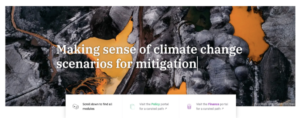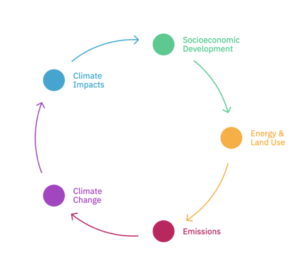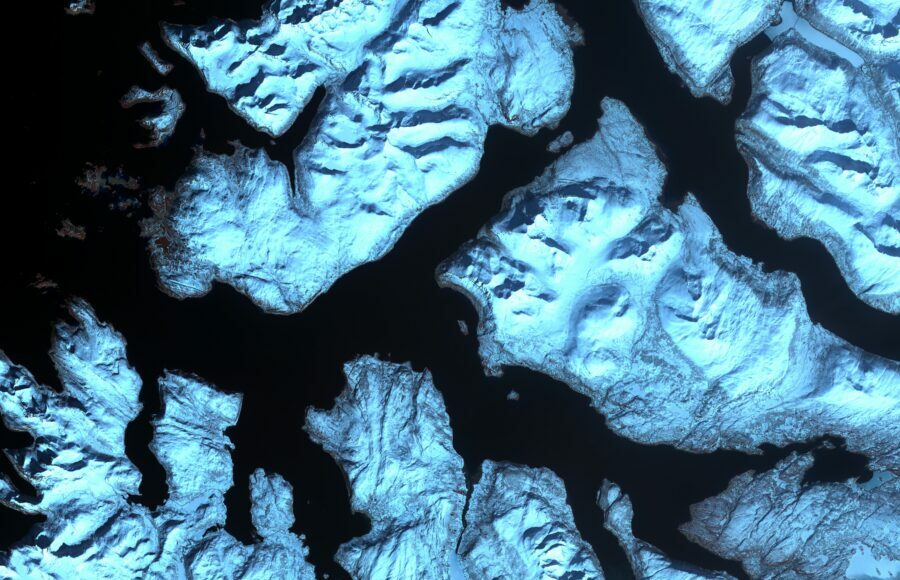INSIGHT by Stockholm Environmental Institute
| To make climate scenarios work for decision-makers an international team of researchers developed a comprehensive interactive online platform. It is the first of its kind to provide the tools to use scenarios – from climate impacts to mitigation and energy options – to a broader public beyond science.
The scenarios will help policy makers and businesses, finance actors and civil society alike to assess the threat of global warming and ways to limit it.
“Climate scenarios are powerful tools that allow us to explore possible climate futures and how they are shaped by our collective actions – which is why we want to enable all kinds of decision-makers to actually make use of them,” said Elmar Kriegler from the Potsdam Institute for Climate Impact Research (PIK) who leads the SENSES consortium that collectively developed the online platform.

Overview of the different modules in the SENSES Toolkit.
“Science has been developing and using climate scenarios for many years, based on computer simulations, yet they’re admittedly a rather complicated matter and results are scattered in all too many scientific publications. We now want to offer a new way of access to those scenarios – so people can see for themselves what is at stake with climate stabilization, and can base their decisions on the best information available.”
“Climate change scenarios can be used as decision-support tools at various geographical scales: global, regional and local. The closer you come to the local scale, impacts and adaptation tend to be more in focus. SEI’s main contribution in the SENSES project was to build knowledge and capacity on how such regional and local scenarios can be constructed together with stakeholders in participatory processes.” – Henrik Carlsen, Senior Research Fellow, SEI, key partner of SENSES

Learn about climate change and climate impacts, but also about the potential solutions: the transformation to a low carbon society. Primer to climate scenarios.
“We focused on linking scenarios across geographical scales, so that regional and local processes can use global scenarios as ‘boundary conditions’ of plausible futures, with regard to climate change but, equally important, also with regard to socio-economic change.” – Henrik Carlsen, Senior Research Fellow, SEI
| From 2°C to coal-exit, from solar power to biomass: a wealth of options
For instance, a finance expert who wants to assess the potential of stranded assets in the fossil fuel industry would be interested to see how rapidly global greenhouse gas emissions must be reduced to keep warming below the internationally agreed limit of 1.5-2°C. The user can check out the emissions gap learning module on the SENSES platform which gives basic information as well as graphics and links to literature.
To further explore the details, the user can go to what the researchers call a Guided Exploration Module (GEM). “The GEMs provide a soft landing in the data and allow users to develop key insights from analyzing the scenarios themselves”, explains project coordinator Cornelia Auer, also from PIK. “They can understand robust trends, like a coal-exit or the decarbonization of electricity, but also variations in the scenarios like the influence of technologies such as carbon dioxide removal.”
For those interested in going even further, there is a Scenario Finder. Users can browse through a large set of scenarios that they filter according to their assumptions about the future. Those who think that removing carbon from the atmosphere in the future is unlikely to work can filter scenarios with a lower amount of bioenergy with carbon capture and storage (BECCS), whereas those who want low final energy use and still a well below 2°C scenario can filter for these characteristics.
| “Assess potential risks to the financial system”
Philipp Haenle, economist in the Financial Stability Department of Germany’s Bundesbank, comments: “Climate-related risks for financial markets are getting more and more attention. Climate scenarios can help to gather an understanding of these risks. For a financial economist, however, getting familiar with climate scenarios designed by natural scientists and using them for financial analyses is a highly complex task. SENSES is a very seminal tool as it can help to understand the underlying climate scenarios as well as to use them to assess potential risks to the financial system. Finally, the tool provides guidance on the most suitable scenarios for specific research questions.”
Haenle has been involved in the science-stakeholder co-design of the SENSES platform (the statement represents a personal opinion and does not necessarily reflect the views of Deutsche Bundesbank or its staff).
While the platform is designed for use by decision-makers and experts, it is open for everyone. “This is really about open science,” says Kriegler. “Finding solutions to tackle the climate challenge is something we can only do together, it is a process that needs to include many different voices and perspectives. Enabling them to use climate scenarios from science is one important element here.” It is a new form of climate service – climate change scenario services.
“We provide users with a lot of if-then. That might seem a bit tedious, but it’s what we feel is necessary,” Kriegler concludes. “The basic idea of climate scenarios is that there is more than one goal, and there are a lot of pathways to those goals. Choosing between options depends on preferences. Yet making choices is not arbitrary, one has to be aware of the consequences. Science-based scenarios provide this kind of critical risk information.”
| about
The SENSES project (climate change ScENario ServicES) is part of the official European Research Area for Climate Services, supported by national ministries and the EU. It is a collaborative project of Potsdam Institute for Climate Impact Research (PIK), Fachhochschule Potsdam, International Institute for Applied Systems Analysis (IIASA), Wageningen University (WUR) and Stockholm Environment Institute (SEI).
More about the scenarios work developed by the international team in the SENSES consortium at www.climatescenarios.org.
Learn about SEI’s research on climate scenarios.
| All opinions expressed are those of the author. investESG.eu is an independent and neutral platform dedicated to generating debate around ESG investing topics.








